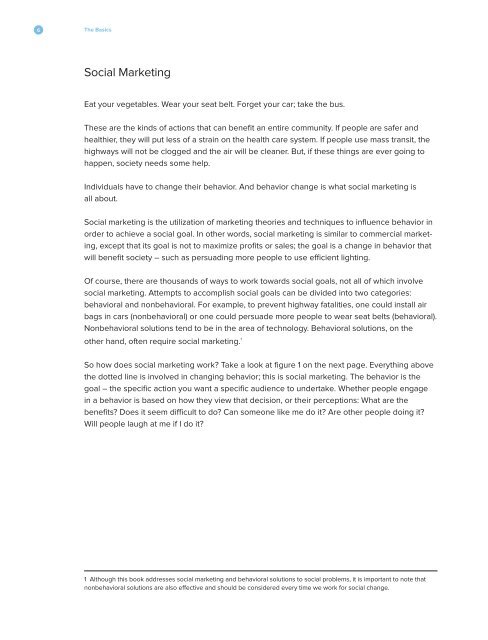Social Marketing
You also want an ePaper? Increase the reach of your titles
YUMPU automatically turns print PDFs into web optimized ePapers that Google loves.
6<br />
The Basics<br />
<strong>Social</strong> <strong>Marketing</strong><br />
Eat your vegetables. Wear your seat belt. Forget your car; take the bus.<br />
These are the kinds of actions that can benefit an entire community. If people are safer and<br />
healthier, they will put less of a strain on the health care system. If people use mass transit, the<br />
highways will not be clogged and the air will be cleaner. But, if these things are ever going to<br />
happen, society needs some help.<br />
Individuals have to change their behavior. And behavior change is what social marketing is<br />
all about.<br />
<strong>Social</strong> marketing is the utilization of marketing theories and techniques to influence behavior in<br />
order to achieve a social goal. In other words, social marketing is similar to commercial marketing,<br />
except that its goal is not to maximize profits or sales; the goal is a change in behavior that<br />
will benefit society – such as persuading more people to use efficient lighting.<br />
Of course, there are thousands of ways to work towards social goals, not all of which involve<br />
social marketing. Attempts to accomplish social goals can be divided into two categories:<br />
behavioral and nonbehavioral. For example, to prevent highway fatalities, one could install air<br />
bags in cars (nonbehavioral) or one could persuade more people to wear seat belts (behavioral).<br />
Nonbehavioral solutions tend to be in the area of technology. Behavioral solutions, on the<br />
other hand, often require social marketing. 1<br />
So how does social marketing work? Take a look at figure 1 on the next page. Everything above<br />
the dotted line is involved in changing behavior; this is social marketing. The behavior is the<br />
goal – the specific action you want a specific audience to undertake. Whether people engage<br />
in a behavior is based on how they view that decision, or their perceptions: What are the<br />
benefits? Does it seem difficult to do? Can someone like me do it? Are other people doing it?<br />
Will people laugh at me if I do it?<br />
1 Although this book addresses social marketing and behavioral solutions to social problems, it is important to note that<br />
nonbehavioral solutions are also effective and should be considered every time we work for social change.

















